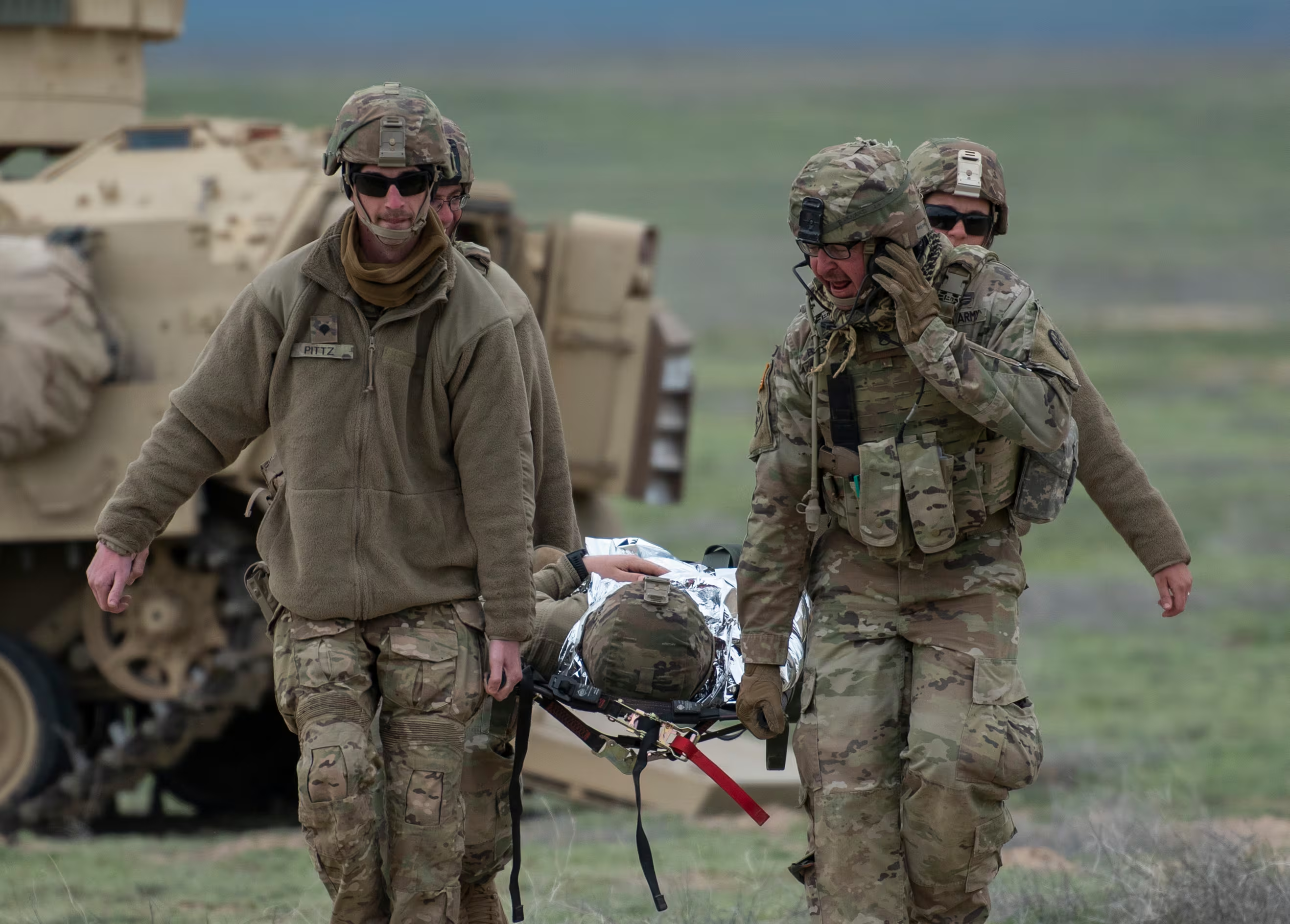source GAIA package: Sx_MilitaryTimes_M6201010007250307_5675.zip Origin key: Sx_MilitaryTimes_M6201010007250307 imported at Fri Jan 8 18:18:03 2016
A former command sergeant major at Walter Reed Army Medical Center fired for allegedly faking his record and wearing unauthorized awards and decorations faces military discipline for a series of bold deceptions that span several years and multiple commands, according to the charges against him.
Sgt. Maj. Stoney N. Crump, the senior enlisted adviser to the medical center's brigade until May 17, twice submitted official biographies that falsely claimed he attended a range of elite schools including Ranger School, Sniper School, Special Forces Assessment Course and Special Operations Combat Medic School, according to the charging documents. He also claimed to have attended the exotic Panamanian Jungle Warfare School, according to the documents.
Between March 2006 and April 2010, at Walter Reed and in Heidelberg, Germany, where Crump served as the Army health center's command sergeant major, he is charged with repeatedly wearing 11 unearned awards and decorations, including the Armed Forces Expeditionary Medal with an Arrowhead device — an indication that he had made a combat jump into Grenada, a deployment that appears nowhere in a summary of his 27-year career that was released by Army Human Resources Command at Fort Knox, Ky.
Crump worked for an actual Medal of Honor recipient, Col. Gordon Roberts, the commander of the Walter Reed Army Medical Center Brigade. Roberts relieved Crump for "unauthorized claim/wear" of honors and insignia, according to Chuck F. Dasey, Walter Reed's strategic communications director.
Crump could not be reached for comment. Dasey said Crump is being represented by an attorney with Fort Belvoir Trial Defense Services, where a representative declined to comment on the case.
Crump has been charged with violating three articles of military law: failure to obey an order or regulation, Article 92; making false official statements, Article 107, and Article 134, a general provision covering conduct that brings discredit on the armed forces.
James Dale, the command sergeant major of the Army's Sergeants Major Academy at Fort Bliss, Texas, when Crump graduated in 2007, now retired, told Army Times he did not remember Crump but suggested the NCO's current plight might serve as a cautionary tale.
"I don't know what motivated this individual. It's absolutely a breach of what we learn as NCOs in the Army," Dale said. "I don't know what to say other than that maybe someone about to make a bad decision might think again."
Crump's apparent deceptions have shown up beyond the medical commands mentioned in the criminal charges.
In the book "100 Sergeants Major of Color," a who's who of African-American sergeants major, Crump is credited with a Senior Parachutist Badge which he allegedly did not earnalong with several awards that he did.
To receive the badge, a soldier must have jumped 30 times and served in an airborne or equivalent unit. Crump's record includes neither the badge, service in such a unit nor a basic jump qualification.
An 2006 autobiographical essay that then-Master Sgt. Crump penned for the Sergeants Major Academy contains details about his Marine Corps service and collegiate history that do not stand up to close scrutiny.
The essay was in an online archive at the Combined Arms Research Library.
In it, Crump says he attended Marine boot camp in 1982 while pursuing a business degree with a pre-law concentration while on academic and athletic scholarships at Duke University in Durham, N.C. Crump says he was selected all-conference and that he had dreamed of playing football professionally.
Crump also claimed to have walked away from the athletic scholarship to advance in the Marines.
A Duke registrar's office clerk said there was no record of anyone by Crump's name attending classes during that period, nor did the university offer undergraduate degrees in business or pre-law. According to Ben Blevins, a sports information official, Crump's name is not on any Blue Devils football roster for that period.
The registrar at East Carolina University, in Greenville, N.C., said its records show Crump attended classes there for four semesters over this period: fall of 1982, spring and summer of 1983, and summer 1985. She said that Crump did not receive a degree, but majored in industrial technology and had been in good academic standing.
Crump appears on the ECU football team's 1983 roster as a cornerback, said Sarah Fetters, assistant director of athletics at the university. That year, the Pirates were ranked No. 20 in an Associated Press poll and finished the season with eight wins and three losses.
Questionable Marine credentials
In his essay, Crump says he was a recruit at Parris Island in 1982 then advanced to Infantry and Advanced Infantry School, where he said he graduated in the top 10 percent of his class, which in turn funneled him into the coveted Marine Corps Reconnaissance and Army Ranger Schools. From there, Crump says he advanced from trainee to rifleman to force reconnaissance team leader.
A summary of Crump's military record released by Marine's Manpower and Reserve Affairs in Quantico, Va., contradicts many of these assertions.
According to the record, Crump entered at Parris Island in October 1983 - a year later than he states in the essay — and exited the Marines in May 1986. He achieved the rank of lance corporal and held military occupational specialty 3051, the code for warehouse clerks.
Crump attended Marine courses at the Army Transportation and Aviation Logistics Schools, Fort Eustis, Va., from January to March 1984, and worked in a supply company of the 4th Supply Battalion, 4th Force Service Support Group, in Raleigh, N.C., until he left the Marines for the Army in May 1986.
"According to his official military personnel file, he was not a 0311 (rifleman)," Marine Maj. Shawn D. Haney, a spokeswoman for Manpower and Reserve Affairs, said in an e-mail. "He had no deployments as a Marine, and he was not part of a recon unit."
In the essay, Crump claims he was deployed to Beirut in the wake of the terrorist bombing of a Marine Corps barracks on Oct. 23, 1983. He said his unit was redirected from Lebanon to Grenada as the U.S. led an invasion of the Caribbean island of Grenada.
Crump described his thoughts as he stood on the deck of naval vessel docked in Lebanon, which, according to Marine records, could not have happened.
"While aboard the ship, I stood looking over the rail, the sun was setting and I began to recap all the events since Basic Training," Crump writes. "I had lost my scholarship and temporarily my dream of graduating from Duke with a Business degree concentrating on pre-law and playing in the NFL."
"Then it dawned on me, I had lost nothing but gained a new me. I was not the same person the football Grit Iron [sic] seemed so remote. My game plan and schedule was no longer one in pursue of conference and national championships but one of world order. My goal was not to defend the goal line but to defend the constitution of the United States of America against all enemies foreign and domestic."
According to Dale, the autobiographical essay was part of a nonfiction writing requirement at the academy designed "to give students with an outlet … just to tell your story." The essays were meant to be read by students' instructors and the commandant, said Dale, who expressed surprise they were part of a public archive.
"It was just to give students an opportunity," said Dale. "We did not release them to anyone."
Crump's other essay at the Combined Arms Research Library is about, ironically, ethical issues faced by other soldiers at an Army hospital in Landstuhl, Germany where he had worked.
According to Army records, Crump enlisted as a medic. He participated in Operation Just Cause, the U.S. invasion of Panama in 1989, with the 142nd Medical Battalion. His only other overseas deployment was to Germany, with an armored unit, and later with medical units in Landstuhl and Heidelberg.
Among other awards in his Army record, Crump received four Meritorious Service Medals, five Army Commendation Medals and six Army Good Conduct Medals.
A retired sergeant major who works at Walter Reed and knows Crump expressed shock at his alleged misconduct.
"Why in the world he would ever have to do that? It's mind-boggling to most of the NCOs here," said the official, who asked not to be named. "He's doing enough and accomplished enough that he could have on his own merits moved through the ranks the way he was. Why on earth did he have to add falsehoods? It's against every principle we profess."
At Walter Reed, Crump worked under Roberts, who on July 1 assumed new duties with the 1st Theater Sustainment Command at Fort Bragg, N.C. Roberts was awarded the Medal of Honor during the Vietnam War for a daring assault that wiped out three machine gun nests.
Within the last several months, Crump was under consideration to replace the departing Command Sgt. Maj. James E. Diggs and become command sergeant major to Maj. Gen. Carla G. Hawley-Bowland, commanding general of the Northern Region Medical Command (Provisional) and Walter Reed Army Medical Center.
On July 14, a week after Crump was charged, Command Sgt. Maj. Frances Rivera, formerly of Brooke Army Medical Center in San Antonio, was named to Diggs' former post.
A slate of senior command sergeants major who served at battalion or brigade level would typically have been reviewed for such a position by Human Resources Command's sergeant major branch. The process normally involves a detailed records review.
Though Dasey would neither confirm nor deny Crump's alleged misconduct was uncovered while he was being vetted for the new job, the Walter Reed official speculated the vetting process exposed Crump.
"Through the vetting, somebody probably picked up something odd, looked into it, and [Crump] probably couldn't explain it, and it probably went downhill," said the official.
Prior to Crump's dismissal, his company commander, Capt. Lance Jelks, investigated allegations of misconduct against Crump and preferred charges under the Uniform Code of Military Justice.
Crump allegedly violated Article 92 when he "willfully failed to ensure" that his personnel records were accurate; he allegedly violated Article 107 by submitting false information in his command sergeant major biography on Dec. 17, 2007, and on Feb. 16, 2009; he allegedly violated Article 134 by "wrongfully and without authority" wearing unauthorized medals "on diverse occasions."
Col. William Shiek, who took over as commander of the Medical Center Brigade, initiated the Article 32, a prerequisite to trial by general court-martial.
Crump's attorney has requested a delay of the Article 32 until Aug. 16, Dasey said.
Based on the investigating officer's findings, Shiek can resolve Crump's case or forward charges to Hawley-Bowland. She can in turn dismiss the charges, take action, or forward the charges to the Military District of Washington for a court-martial.





